Millennium feels destined to always be “the other Chris Carter show”, the younger and less successful sibling of The X-Files. The show had launched to considerable fanfare. Thanks to the cultural cache of Chris Carter and an impressive marketing campaign from Fox, The Pilot scored record viewership figures for the young network. It was quite clear what Fox expected from Chris Carter’s new show. They wanted another mega-hit that could slowly grow in the Friday night slot before grabbing the zeitgeist.
This is entirely understandable. After all, nobody at Fox had expected The X-Files to succeed on the level that it did. In its first season, none of the executives could have foreseen it outperforming The Adventures of Brisco County, Junior – let alone beginning a run that would last nine years. However, despite the skepticism of the executives, it was clear that The X-Files had “it” – that almost imperceptible quality that can turn a good (or even great) show into must-watch water-cooler television.
By the time that Fox commissioned Millennium, it was clear that Carter had created something popular and accessible. The network wanted a repeat performance. The writer and producer was given a large budget and a great deal of creative freedom. The Pilot went straight to show, with a minimum of interference from the network. Part of this was down to the respect owed to Carter, but it also seemed like part of this was an acknowledgement that the success of The X-Files meant that Carter knew what he was doing better than anybody at the network.
However, there seems to have been something of a miscommunication or misunderstanding somewhere along the line. The X-Files was always going to be Chris Carter’s most populist and accessible work. It is quite clear from The Pilot that Carter was not interested in repeating himself. Millennium was not a show that was going to mimic the warmth or playfulness of The X-Files. It was a lot more sombre and serious than The X-Files had ever been, refusing to offset its darker moments with anything more than token levity.
This was arguably reflecting in the casting of the show. David Duchovny and Gillian Anderson are perfectly cast in The X-Files, but they were both young and attractive performers when they first appeared in the roles. (Not to be superficial, but they are still very attractive performers.) Duchovny and Anderson are exactly the sort of actors one might associate with a hip young show. In contrast, Lance Henriksen was fifty-six years old when The Pilot aired. Even then, he never had the matinée idol looks.
This is not a knock on Henriksen. His work as Frank Black is absolutely phenomenal. It might just be the best role of an incredible (and varied) career. Henriksen brings a wonderful stoic humanity to a character who has seen so much horror. The actor gives Frank Black a dignity and poise that makes the character a presence. Frank Black’s stillness is his defining feature, to the point where seeing Frank angry in episodes like The Beginning and the End or Goodbye to All That is nothing short of striking.
At the same time, Frank Black is not the most dynamic of protagonists. He lacks the sorts of insecurities or issues that made Mulder and Scully seem so very human. Chris Carter has argued that he wrote Frank Black as the archetypal Western hero – something that comes to the fore in episodes like Covenant, Broken World and Nostalgia – but this does mean that Frank is (superficially) a much less compelling or engaging lead character than Mulder and Scully were when The X-Files first appeared.
One of the great things about the work of writers like Glen Morgan and James Wong or Chip Johannessen was a willingness to humanise and develop Frank. In particular, the version of Frank who appears in the second season feels more like a real person than the character introduced in The Pilot. The second season gives Henriksen more to work with, and a lot more humanity to explore. At the start of the first season, it is hard to know what to make of Frank Black beyond the fact that he is fundamentally a good guy in a way that Fox Mulder and Dana Scully are not.
There is a sense that this was the problem with Millennium. It can be a very tough show to watch and enjoy. In particular, its first and third seasons do not lend themselves to “binge” watching or mass consumption in the same way that The X-Files does. The show might be an exquisitely-crafted examination of human depravity and suffering, but there is a capacity to how much the audience can take. That is perhaps why the second season works better than the seasons either side of it. It is a lot easier to enjoy, without sacrificing the show’s core themes.
This is not to suggest that the darkness of Millennium was a mistake. That heavy and oppressive atmosphere was precisely calibrated by the production team. There is no doubt that Carter successfully pitched the show at the level that he wanted to pitch it. This is Carter’s artistic vision, uncompromised by the demands of network television or fickle audiences. In this era of focus-group testing and network notes, it is hard not to admire Carter for making the show that he very clearly wanted to make.
In many respects, Millennium is an auteur show. It is a decidedly noncommercial piece of television, one that does not have a great deal of mass appeal. It is atmospheric and moody, abstract and surrealist. It is genuinely and shockingly brutal. With The Pilot, writer Chris Carter and David Nutter found a way to portray genuinely nightmarish content within the boundaries set by broadcast standards and practices. Frank’s “flashes” of horror are as unsettling and unnerving as the worst of The X-Files, but they arrive with incredible frequency.
Much is made of the influence of Millennium on the larger television landscape. This is certainly fair. Shows like CSI and Criminal Minds owe a conscious debt to Millennium in terms of content and style. Frank’s signature “flashes” are a major visual influence on most contemporary crime shows. However, it is telling that the more mainstream and successful shows tend to tone down the horror and abstraction of these quick cuts. They downplay the nightmarish horror of these visions, instead treating them as a way to convey plot information.
Millennium arguably has more in common with contemporary “prestige” drama like Hannibal or True Detective. Bryan Fuller all but acknowledged the influence of Millennium on Hannibal by casting Lance Henriksen in a guest role during the show’s first season. Like Millennium, it feels like Hannibal and True Detective are trying to make profound and meaningful statements about the world as it exists today. The horror and brutality of the shows is simply a channel through which these larger themes might be explored.
Tellingly, Hannibal and True Detective both lean more towards impressionist horror in their meditations on human depravity – much like Millennium did. In Hannibal, Will Graham and Hannibal Lecter are haunted by “the stag man”, a grotesque metaphorical construct. In True Detective, the existential horror of Robert Chambers’ Carcossa threatens to impose itself upon this plane of existence. In Millennium, Frank is constantly assaulted by images of demons and monsters influencing human atrocities.
There is a sense that Millennium was a deeply important project to Chris Carter. The first and third seasons of the show can be particularly heavy-handed in their meditations on the nature of evil as a corrupting force in the world. The first season focuses on the image of Frank’s “big yellow house” as a fortress constantly under siege from a chaotic and brutal outside world. The protagonist of the show was named Frank Black. There were literal angels and demons at work in the world.
Millennium was never particularly subtle, but that was part of the appeal. There was little sense of compromise to the first two seasons of Millennium. The first half of the third season did feel like an attempt to reinvent Millennium as a knock-off of its more popular elder sibling, but the show quickly wandered back to its own unique strand of existential weirdness. Millennium was a show that was utterly unlike anything else on television, even shows that shared genres. It was very hard to classify, but that seemed to be the point.
There were points in the run of The X-Files were the show could seem particularly abstract or philosophical. The three-parter that bridges the sixth and seventh seasons of the show – Biogenesis, The Sixth Extinction, The Sixth Extinction II: Amor Fati – is perhaps the most obvious example. Entire episodes (like Memento Mori or Redux I) could be given over to extended monologues. Certain episodes (like Jose Chung’s “From Outer Space” or Musings of a Cigarette-Smoking Man) were practically avant garde.
However, The X-Files never felt as weird or impressionistic as Millennium. The two-parter Lamentation and Powers, Principalities, Thrones and Dominions covers similar thematic ground to Colony and End Game or Patient X and The Red and the Black, but in a much more abstract manner. This also applied to the show on a weekly basis. Although the first season began with a number of formulaic serial killer plots, the show quickly found its more experimental and surrealist tendencies.
The X-Files could be experimental in its own way (The Post-Modern Prometheus, Triangle), but it could not compete with the sheer frequency and audacity of Millennium‘s eccentricity. No single stretch of The X-Files could compete with Millennium‘s ability to produce shows like Force Majeure, Maranatha, The Curse of Frank Black, Jose Chung’s “Doomsday Defense”, Luminary, Anamnesis, A Room with No View, Somehow, Satan Got Behind Me, The Time is Now, … Thirteen Years Later, Borrowed Time, The Sound of Snow or Saturn Dreaming of Mercury.
Even the mythology of Millennium was rather abstract, with fans (and the production team) struggling to find a clear throughline running through the interconnected episodes. The mythology of The X-Files advances in a (relatively) linear and (relatively) clear fashion between The Pilot and The Truth, with layers pulled back and secrets revealed as Mulder and Scully move along. The execution might have been clumsy, but it was a relatively straightforward plot arc. In contrast, the mythology of Millennium is so hazy that it is possible to argue about whether it actually exists.
The show repeatedly suggested that Frank was caught up in the middle of some war in heaven, but in never provided any real explanation or logic for that conflict. Angels and demons seemed to be locked in some heated battle involving mankind, with Frank occasionally drawn into conflicts beyond his understanding. Fans of Millennium have great fun tying together the so-called “Legion” arc that is nowhere near as concrete or as rational as the colonisation arc on The X-Files. In many respects, Millennium is a show more about tone or atmosphere than plot or narrative.
This was even the case across the second season, which had perhaps the clearest plot and character arcs. The mythology of the second season was intricate and painstakingly detailed, but its details were intentionally vague and abstract. The details of the Millennium Group and the organisations working in opposition to the Millennium Group were kept relatively vague, with the storytelling more keenly focused on the philosophies and practicalities of conspiracy than the details themselves.
The Millennium Group was never developed and explored to the same extent as the conspirators on The X-Files. The details that did not fit together seemed like they were never meant to fit together, with the importance of the True Cross in Owls and Roosters seeming like an intentional red herring when it came to the actual apocalyptic crisis in The Fourth Horseman and The Time is Now. Even when the third season revealed all manner of secret Millennium Group plots, it was ambiguous how they fit together or advanced the goals of the Millennium Group.
Millennium had a somewhat complicated relationship with The X-Files. The X-Files was a more populist and accessible show produced by the same company and dealing with many of the same big ideas and perspectives. A particularly cynical reading of Millennium might suggest that Carter had taken the core of The X-Files and decided to replace monsters with serial killers and aliens with demons. However, the relationship was far more complex than such a dismissive summary might suggest.
There is a lot of overlap between the characters of Fox Mulder and Frank Black. Both are gifted forensic profiles, owing a lot to the character of Will Graham. It could be argued that both characters experienced breakdowns; Mulder never recovered from the revelation that his sister was taken by aliens, while Frank has retired from the FBI following his own nervous breakdown. At the same time, there are key differences. Mulder is snarky and irreverent, occasionally downright childish. Frank is more sobre and sombre, an adult with real responsibilities.
The first two seasons of Millennium playfully teased the idea that Millennium existed in the same conceptual space as The X-Files. The photo doubles of David Duchovny and Gillian Anderson cameoed in a scene from Lamentation, while a beloved X-Files guest star popped up in Jose Chung’s “Doomsday Defense.” A very conspicuous shot from The Time is Now seemed to imply that the Cigarette-Smoking Man was a member of the Millennium Group. Meanwhile, Human Essence suggested that The X-Files existed as a television show in the world of Millennium.
Millennium was inevitably going to share some thematic concerns with The X-Files. Quite a few of the writers worked on both shows – Chris Carter, Frank Spotnitz, Glen Morgan, James Wong and Darin Morgan. More than that, Carter had been inspired to write Millennium based on some of his own work on The X-Files, particularly the episode Irresistible. In the year that Millennium debuted, Vince Gilligan would write two superb serial killer stories for The X-Files; he seemed to be teasing the similarities between the two shows with Unruhe and Paper Hearts.
However, there was one very significant difference between The X-Files and Millennium. In many ways, The X-Files was a show that was fixated on the past. It was frequently a celebration of the quirky little places in America that were being eroded or destroyed by the forces of globalisation. Quite often, The X-Files looked mournfully to the past as it became clear that the eccentric spaces in the American consciousness were being torn down and dismantled to be replaced by strip malls and parking lots.
In contrast, Millennium looked to the future. Millennium was a show that was very firmly rooted in fears about what the future represented. In The Pilot, the Frenchman is driven insane by biblical prophecy; in Gehenna, Frank worries about the possibility of a death cult on American soil. These fears were most explicit during the race towards the apocalypse in the second season, or the battle between hope and fear for the future in the third season. The idea that Millennium was a show about the future was reinforced by the fixation on Jordan Black, Frank’s daughter.
This is perhaps the biggest difference between The X-Files and Millennium. Fox Mulder is a character primarily defined by the loss of his sister, a childhood trauma that shaped him into the guy who sits in the basement ranting about aliens to anybody who will listen. When we join Frank in The Pilot, the character is recovering from a nervous breakdown, but his fixation is also about protecting Jordan from the chaos and cruelty of the outside world. Frank’s anxieties around Jordan weave through scripts like Dead Letters, Walkabout and Saturn Dreaming of Mercury.
The title of the first X-Files film might have been The X-Files: Fight the Future, but it seemed like Frank was more likely to wage that particular conflict than Mulder and Scully. The apocalyptic threat posed by colonisation was always presented as the legacy of a betrayal stretching back to the seventies. In contrast, Frank seemed to be facing the decay and collapse of social order in any number of radical forms as the millennium itself approached. Each year brought its own threats, but most were focused on the future.
Then again, this underscores the fact that it is very hard to talk about Millennium as a single holistic entity, because the show constantly reinvented itself over its short three-season run. These were not superficial changes, either. It seemed like the show fundamentally changed its identity during each summer break. The first season was a hard crime procedural with heavy religious undertones; the second season was an apocalyptic conspiracy thriller about the dissolution of a family; the third season was a messy blend of those two facets, never sure what it was doing.
Each of the three iterations have a lot to recommend them. The first season starts slowly and painfully, but hits its stride once it reaches Force Majeure and The Thin White Line. The second season is quite possibly the best season of television that Ten Thirteen ever produced, a strong thematic season that builds perfectly from the opening teaser of the first episode to the closing credits of the last. The third season has a bumpy start and never hits the consistent highs of the first two years, but it contains any number of underrated episodes.
With all of this going on, it is understandable that Millennium never quite embedded itself in the popular consciousness in the same way as The X-Files, that it does not cast the same long shadow. After all, it is debatable whether Frank Black is Lance Henriksen’s defining role. The actor is probably more recognisable for his work on Aliens than for his superlative three-year stint as Frank Black on a network television drama. The show never achieved the cultural cache of The X-Files.
Even after The X-Files ended, Mulder and Scully lingered on. David Duchovny and Gillian Anderson would reprise the roles in The X-Files: I Want to Believe six years after the last episode. They would be recruited to headline a television revival thirteen years after the end of the show. In contrast, Lance Henriksen’s last official appearance as Frank Black was a guest appearance in an episode of The X-Files six months after the broadcast of Goodbye to All That in May 1999.
Still, the show made quite an impression. Millennium has a wonderful (and very vocal) on-line fandom who work hard to keep the show alive in pop cultural memory. There have been books published about the show. Frank Black made a guest appearance in IDW’s X-Files comic book series before spinning off into his own Millennium miniseries. The show is well-loved by television creators like Bryan Fuller and Vince Gilligan, ensuring that it does have a larger legacy than most people would admit.
Millennium could never quite compete with The X-Files in terms of popularity or cultural cache. But it was never really meant to. Instead, the joy of Millennium lies in its state as an oddity or an eccentricity. It is remarkable and worthy precisely because it lacks the polished sheen or the casual charm of The X-Files. Its earnestness is occasionally a little heavy-handed and clunky, but its sincerity is always affecting. It is perhaps unfairly overlooked in discussions of nineties television in general and Chris Carter’s legacy in particular.
 Season 1
Season 1
October 25, 1996 – May 16, 1997
- Pilot
- Gehenna
- Dead Letters
- The Judge
- 5-2-2-6-6-6
- Kingdom Come
- Blood Relatives
- The Well-Worn Lock
- Wide Open
- The Wild and the Innocent
- Weeds
- Loin Like a Hunting Flame
- Force Majeure
- The Thin White Line
- Sacrament
- Covenant
- Walkabout
- Lamentation
- Powers, Principalities, Thrones and Dominions
- Broken World
- Maranatha
- Paper Dove
 Season 2
Season 2
September 19, 1997 – May 15, 1998
- The Beginning and the End
- Beware of the Dog
- Sense and Antisense
- Monster
- A Single Blade of Grass
- The Curse of Frank Black
- 19:19
- The Hand of St. Sebastian
- Jose Chung’s “Doomsday Defense”
- Midnight of the Century
- Goodbye Charlie
- Luminary
- The Mikado
- Pest House
- Owls
- Roosters
- Siren
- In Arcadia Ego
- Anamnesis
- A Room With No View
- Somehow, Satan Got Behind Me
- The Fourth Horseman
- The Time is Now
 Season 3
Season 3
October 2, 1999 – May 21, 1999
- The Innocents
- Exegesis
- TEOTWAWKI
- Closure
- … Thirteen Years Later
- Skull and Bones
- Through a Glass Darkly
- Human Essence
- Omertà
- Borrowed Time
- Collateral Damage
- The Sound of Snow
- Antipas
- Matryoshka
- Forcing the End
- Saturn Dreaming of Mercury
- Darwin’s Eye
- Bardo Thodol
- Seven and One
- Nostalgia
- Via Dolorosa
- Goodbye to All That
 Acknowledgements
Acknowledgements
These reviews draw from a wide range of sources and inspirations. The individual reviews cite any print sources and link directly to any on-line sources. However, it is important to single out a few invaluable resources who have informed and shaped this project, providing valuable insight and even offering material that directly informed the reviews.
- Back to Frank Black – including their wonderful self-titled collection of interviews and essays on the production of Millennium that is really the beginning and the end of fan discourse on the show. It is available from Amazon.com.
- Fourth Horseman Press – a fantastic index of information about the show, including airdates and behind the scenes trivia about each and every individual episode.
- This Is Who We Are – an archive of Millennium specific interviews with cast and crewmembers, as well as episode transcripts and behind the scenes materials.
- Eat the Corn – an archive of interviews and information more specific to The X-Files, but which still contains a lot of information relevant to the development of Millennium.
- John Kenneth Muir – one of the finest horror critics on-line, who has written quite a bit on the work of Chris Carter; notably one of the few mainstream critics to really delve into the show’s place in Carter’s oeuvre.
- Glen Morgan – always willing to answer inane questions about the second-season show in a good-natured and patient manner. Also, not a shabby writer in his own right.
- The cast and crew of Millennium – whose work inspired this project, and who contributed to one of the most compelling and intriguing television dramas of the nineties.















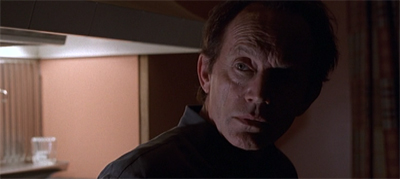


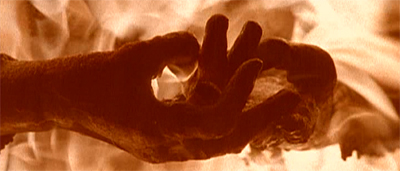
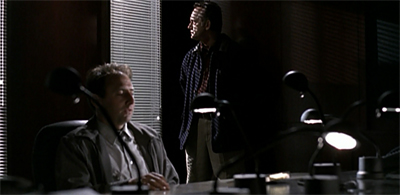


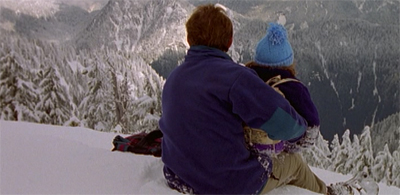


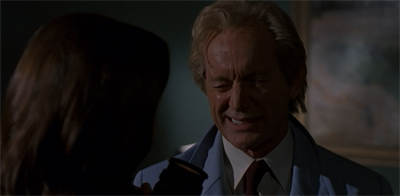


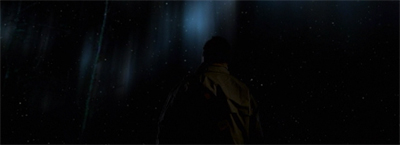









Are you folks going to continue into season two with your Millennium reviews? I certainly hope so, as they’ve been wonderful to read in conjunction with watching the show.
No worries!
They’ll actually be starting again this Friday, if all goes well.
Great article. I’m a fan of all the shows you’ve mentioned above and got a real kick of seeing Hannibal’s nod to Millennium in casting Lance Henriksen (not to mention the Millennium sound effect as he bangs his fist on the arm of the couch in that episode). I revisit Millennium every couple of years and it’s impressive how well that show has held up 20 years later. Each season, which vastly different, was also hugely engrossing. I would have loved a season four. One of the most under rated shows to have appeared on TV in my opinion, but I’m thankful it lasted the three seasons it did.
Thanks Krissy. It is a wonderful weird little show. The second season remains on of my favourite seasons of television ever.
I started a rewatch of Millennium, one of my favorite television shows ever, back in December of 2018, and I just happily stumbled across your reviews here today, while in the midst of S2. I haven’t watched the show in over 10 years, aside from the occasional holiday The Curse of Frank Black or Midnight of the Century (Season 2 is one of my favorite Seasons of TV of all time). I’m really impressed with what I’ve read so far and the care and attention to detail put into these reviews, and I look forward to reading through all of them! I can second the Back to Frank Black book/campaign as a wonderful addition for any fan as well. Additionally, a documentary made by some of the same folks, Millennium After The Millennium, came out in 2018, which I highly recommend to any fan. I’m looking forward to working my way through these reviews!
That review has been on the watch list for a while. Really looking forward to it.
This series certainly speaks to our current era, where the past is glorified and the future is presented as horrifying. The media echoes the word crisis, climate change is actively occurring, micro-plastics are everywhere, corporate greed is rampant, and politicians seem to be more tools of big business than anything else. The past isn’t interrogated, as in the X-Files, but treated like a reverent object to aspire back to. The circles have tightened, and everything outside these tight circles are considered irrelevant. Our world is becoming more apocalyptic, and a show like Millenium, which explores that angle from a largely personal perspective, is quite timely right now.